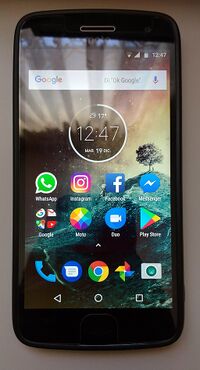Motorola Moto G5 Plus (motorola-potter): Difference between revisions
Appearance
m →Mainlining: Add some warnings about mainline kernel not working in some situations |
→Mainlining: Update mainling status |
||
| Line 81: | Line 81: | ||
Currently, the following works: | Currently, the following works: | ||
* Display | * Display | ||
:* only Boe panel, basic power management | |||
:* using labibb regulator driver from mainline patchworks: 1239224 | |||
* Backlight | |||
:* qcom-wled | |||
:* brightness control doesn't work correctly, only on or off states | |||
* GPU (DRM and FB) | * GPU (DRM and FB) | ||
| Line 88: | Line 98: | ||
* SSH and Telnet via USB | * SSH and Telnet via USB | ||
:* Sometime you might get stuck with no prompt, or a password prompt, or the connection may seem to lag. No fix has been found yet, but a temporary workaround is to run <code>ping 172.16.42.1</code> in another terminal, while using ssh or telnet. | :* Sometime you might get stuck with no prompt, or a password prompt, or the connection may seem to lag. No fix has been found yet, but a temporary workaround is to run <code>ping 172.16.42.1</code> in another terminal, while using ssh or telnet. | ||
Revision as of 15:06, 12 May 2020
 Moto G5 Plus | |
| Manufacturer | Motorola |
|---|---|
| Name | Moto G5 Plus |
| Codename | motorola-potter |
| Released | 2017 |
| Hardware | |
| Chipset | Qualcomm MSM8953 Snapdragon 625 |
| CPU | Octa-core 2.0 GHz Cortex-A53 |
| GPU | Adreno 506 |
| Display | 1080 x 1920 IPS LCD |
| Storage | 32/64 GB |
| Memory | 2/4 GB |
| Architecture | aarch64 |
| Software | |
| Original software | Android 7.0 Nougat |
| postmarketOS | |
| Category | testing |
| Pre-built images | no |
| Mainline | no |
| Flashing |
Partial |
|---|---|
| USB Networking |
Works |
| Internal storage |
No data |
| SD card |
No data |
| Battery |
Broken |
| Screen |
Works |
| Touchscreen |
Broken |
| Multimedia | |
| 3D Acceleration |
Broken |
| Audio |
Broken |
| Camera |
No data |
| Camera Flash |
No data |
| Connectivity | |
| WiFi |
Broken |
| Bluetooth |
Broken |
| GPS |
Broken |
| NFC |
No data |
| Modem | |
| Calls |
Broken |
| SMS |
Broken |
| Mobile data |
Broken |
| Miscellaneous | |
| FDE |
Broken |
| USB OTG |
No data |
| HDMI/DP |
No data |
| Sensors | |
| Accelerometer |
Broken |
| Magnetometer |
No data |
| Ambient Light |
No data |
| Proximity |
No data |
| Hall Effect |
No data |
| Haptics |
No data |
| Barometer |
No data |
Contributors
- chin123
- uknown
Maintainer(s)
- chin123
- uknown
How to enter flash mode
- Power + Volume Down buttons
Installation
$ pmbootstrap flasher flash_rootfs
$ pmbootstrap flasher boot
Photos
Notes
- The flashlight can be switched on with:
$ echo 1 > /sys/class/leds/led\:switch/brightness
and it can be switched off with:
$ echo 0 > /sys/class/leds/led\:switch/brightness
- The charging LED can be switched on similarly, simply substitute `led\:switch` with `charging`. The charging LED will only blink as of now.
- You can change the screen brightness with:
$ echo $brightness > /sys/class/leds/led\:switch/brightness
Mainlining
Mainlining is in the early stages, based on Junak's msm8953 kernel. Source for the kernel is available here:
https://github.com/scarface-one/linux-msm8953
| Currently on works on XT1686, the Indian variant, with board_id = <0x46, 0x83a0>. Porting to other variants of potter should be trivial |
| Lk2nd is currently a hard dependency, without it the mainline kernel will not boot. You can get lk2nd for potter from here: https://github.com/scarface-one/lk2nd |
Currently, the following works:
- Display
- only Boe panel, basic power management
- using labibb regulator driver from mainline patchworks: 1239224
- Backlight
- qcom-wled
- brightness control doesn't work correctly, only on or off states
- GPU (DRM and FB)
- requires proprietary firmware blobs, can be extracted from Android, or can be downloaded from firmware repositories
- SSH and Telnet via USB
- Sometime you might get stuck with no prompt, or a password prompt, or the connection may seem to lag. No fix has been found yet, but a temporary workaround is to run
ping 172.16.42.1in another terminal, while using ssh or telnet.
- Sometime you might get stuck with no prompt, or a password prompt, or the connection may seem to lag. No fix has been found yet, but a temporary workaround is to run
- Touchscreen
- Synaptics 3203B, works using mainline RMI4 driver, currently uses a hack to keep gpio64 on, should be fixed to get proper power management
- NFC
- Not tested, but driver loads and binds correctly, so it should work
Anything that isn't listed above can be assumed to not work.
Links
- GSM Arena specifications page: https://www.gsmarena.com/motorola_moto_g5_plus-8453.php
- TWRP Recovery: https://twrp.me/motorola/motorolamotog5plus.html